- Home
- Nnedi Okorafor
Ikenga Page 6
Ikenga Read online
Page 6
Nnamdi opened his eyes and the dreams instantly shrunk away. This dream seemed far less serious than the one he’d had the first night he’d changed. He shook his head, rubbed his face, and looked outside. Still night. He sat up and picked up the Ikenga. The strange electrical charge coming from it no longer really hurt. Instead, it felt like a force making his hand do what he didn’t tell it to do. The Ikenga was still warm. He turned it over, feeling the charge softly thrum in his fingertips. What would happen if he threw the thing in the garbage? Would he stop changing? He didn’t want to throw it away, though; it was a gift from his father, a gift his father could only give or not give, with no advice.
He focused his eyes on it. Then he strained with all his might to intentionally bring forth his shadow body. He thought about the feeling of being big. Being powerful. Being black like the moonless night. He imagined he could hear a pin drop from ten houses away. That he could smell a drop of gasoline leaking from the generator next door. That he could feel the slightest shift in the air as someone walked by outside.
What if he could teach himself to control it? Then he could be a mighty force in Kaleria. He could be his father 2.0. Maybe this was why his father had even given it to him, to make him Nnamdi, the young son of the town’s greatest police chief, who had finished what his father started. He’d be like Batman. Yes, he thought. I could teach myself to control it. It would all make sense. “Oh, let’s give it a try,” he whispered. He took a deep breath. “Okay, here goes.”
Nnamdi held his breath and imagined he was wrestling a great shadowy beast. He strained until his head ached, trying to squeeze the beast within him into a shape he could control. He felt it move within him and then fall on top of him, knocking the breath from his chest. “Ooof!” he grunted. He gathered himself and tried again. Then again. Then again. Breathless, he lay back on his bed. He stayed that way for an hour, thinking and thinking. Eventually, he fell asleep. He had not one dream.
Untruth
“A BAD DAY for Bad Market,” the newsletter headline shouted.
“I’ll read it when I get home,” Nnamdi muttered to himself, handing naira to the seller, folding the newsletter under his arm, and walking away from the newsstand. It was Saturday morning and people were taking advantage of the pleasant cooler weather. Some sat outside their homes, playing cards and sipping from cold bottles of beer. The woman who sold akara was already preparing her frying pan, small fire, and oil to fry the tasty bean cakes she’d sell that afternoon.
“Good morning, Mrs. Abassi,” Nnamdi said.
She smiled. “Good morning, Nnamdi.” He’d known Mrs. Abassi since he could remember. His father loved her akara and would buy from her several times a week. She was a smart old lady, especially when it came to math. Nnamdi and Chioma often came to her for help with homework when she wasn’t busy. “Is that today’s paper?” she asked.
“Yes,” he said.
“Read that one myself,” she said. “Bad Market, what a waste of a young man. But who do you suppose this so-called shadow man is? He must be really black. Maybe he is a yam farmer who is sick of Kaleria’s problems.”
Nnamdi shrugged, avoiding her eyes.
“Doesn’t matter to me, either,” she said. “As long as he sticks around. A man like that, we need him here.”
* * *
When Nnamdi got back, his mother was in the kitchen, preparing a breakfast of pap with a bit of sugar and condensed milk as she quietly talked on the phone. She’s in a good mood, Nnamdi thought. She turned her back to Nnamdi so that he couldn’t quite hear what she was saying and Nnamdi glanced curiously at her for a moment. However, he had other more pressing concerns and he quickly turned his attention to the paper. He sat at the table and unfolded it, a frown on his face. The story’s headline bothered him when he read it a second time. “A Bad Day for Bad Market” sounded almost sympathetic to Bad Market’s plight. That couldn’t be right.
His mother giggled as she stirred Nnamdi’s pap. He looked up and frowned more deeply. Who was she talking to? When she didn’t look back, he sighed, returning his attention to his newsletter. His father used to buy the newsletter every morning, too. Reading it from beginning to end was his first activity each day. Nnamdi began to read.
Yesterday, in broad daylight, one of Kaleria’s greatest nuisances was assaulted. “I was sure he was going to kill me,” a tearful and beaten Bad Market said. He explained that after he had robbed the market, the mysterious man had snatched him up and beaten him bloody. He said his life would have surely been over if it hadn’t been for people coming to see what was happening. . . .
His mother placed his bowl of pap before him and he barely noticed. “This can’t be right,” Nnamdi whispered. His mother left the kitchen and he was glad. He couldn’t have hidden the disgust on his face. The worst part came a few paragraphs later. The new chief of police, who’d been sworn in three months after his father’s death, took advantage of the moment to make a strong statement—a statement that included a photo.
Concerning the incident, Chief of Police Ojini Okimba laid down the law. “We don’t know who this mysterious wannabe vigilante is,” Chief Okimba said. “He makes no effort to give a statement at the police department. He leaves no letter. He tells nothing to anyone. All we know is that he is a big, tall dark-skinned man. So I will call him that. The Man. And listen to me well when I say that the Man is a MENACE TO SOCIETY and should be treated as such. There is no room for primitive irresponsible ‘jungle justice’ in my civilized town. We are making every effort to arrest the Man and bring him to proper justice like every other criminal.”
On the front page was a photo of Chief Okimba looking strong and confident in his expensive suit. Nnamdi bristled. He hadn’t liked Chief Okimba since his father’s funeral, where the man had given a speech that subtly blamed Nnamdi’s father for his own death. Okimba said that Nnamdi’s father was probably too hard on criminals and too good a man for his job. Nnamdi remembered the exact words in Okimba’s speech that had really angered him: “In his next life, such a fine police officer will know better.”
There had been frowning, grumbling, and forced applause afterward. No one knew if Okimba was complimenting or insulting Nnamdi’s father. But Nnamdi’s mother wasn’t confused at all. She knew Chief Okimba was insulting Nnamdi’s father’s efforts and she was seething with anger. Nnamdi had followed her into the kitchen for a few minutes, where his mother wept and cursed Okimba. He remembered looking out the window, facing the event tent where everyone was gathered, and seeing Chief Okimba shamelessly posing for pictures near the open casket.
The next day, those very pictures were on the front page of the Kaleria Sun. The caption read, “In Comes Okimba, the Gentle Giant to Stamp Crime Out with Flash and Dash.”
And now here was Okimba doing and saying stupid things again. What Nnamdi had done was not “jungle justice,” not really. It certainly wasn’t “irresponsible.” What about the drunk driver who was lynched in the streets months ago? His burned-up vehicle remained on the side of the road, serving as a warning for possible future drunk drivers! Chief Okimba was still silent on that incident. Now Chief Okimba, who was known for taking bribes himself, was urging Kaleria’s citizens to be vigilant. And worst of all, according to the newsletter, he was offering a small reward for any information about the identity and whereabouts of “the Man.”
On the third page, where the story continued, there was a photo of Bad Market looking pathetic and unconscious on the ground. He was tied with the scarf and his mouth was open, saliva dribbling from the side. Nnamdi took one look at the ridiculous photo and, despite himself, burst out laughing.
There was a knock at the door and Nnamdi immediately quieted. The sound reminded him of the night his father died, when he’d opened the door and found the envelope containing that letter. But it was morning. And the knock was fast and light. Chioma.
“I’ll ge
t it,” Nnamdi called, getting up.
Chioma wore jeans and a T-shirt, had a hand on her hip and an inquisitive look on her face. “Good morning, Nnamdi,” she said. “My mum is soaking stockfish and mangala fish. The house stinks like crazy. What is it with bad smells? First Bad Market and now this!” Chioma had a sensitive nose and was always complaining about various smells. She said this was why she would never live in Lagos. She always left the house and came over when her mother was soaking dried fish.
Nnamdi laughed. “Come on, then,” he said. “I’ll take you where it smells like flowers.”
She grinned and they went around back to the garden. Nnamdi knelt down to touch the delicate leaves of the yam vine as Chioma slowly walked through the garden. In a matter of days, the vine had grown so much.
“You did all this?” Chioma asked, poking at a fattening tomato.
Nnamdi only smiled. His father had planted the garden. The foundation had been laid years before Nnamdi was even born. “It’s Daddy’s garden, always has been.”
“Oh, you know what I mean,” Chioma said.
Nnamdi shrugged.
“What did you plant here?” she asked, pointing to the bare patch. There had been some roses there, but they had died during the year of neglect.
Nnamdi looked at the yam vine and couldn’t keep the smile from his lips when he said, “Your sunflower seeds.”
Chioma squealed with delight. “Really?! Finally! I’m so glad!”
“Oh, calm down,” he quickly said with a soft laugh. “Sunflowers need a lot of care. I don’t know if they will grow.”
But Chioma only stared at the spot and grinned, and Nnamdi knew she’d blocked out his negativity. Sunflowers were her “favorite, favorite, favoritest flower on earth.” He’d known that when he planted them and he’d known she’d nearly die with happiness when he told her.
“I’m going to come by every day until they are huge flowery suns!” she announced. “I’ll help you water them.”
Nnamdi just laughed. Chioma was so predictable.
“Nnamdi . . .” She paused, looking back at the house. He could hear his mother talking on the phone. “Come walk with me,” she said, lowering her voice. “I want to ask you something.”
“Okay,” he slowly said, hoping it wasn’t anything difficult to explain.
After telling his mother where they were going, they quickly walked around the house to the front.
“Did you see the newsletter?” Chioma asked. They waved to Mr. Oke as they slipped through the open gate.
“Yeah.”
“Daddy nearly choked on his bread, reading it this morning,” she said. She snorted. “Did you see that picture of Bad Market?”
“He deserved to be shown like that,” Nnamdi said.
She nodded. “Bad Market once robbed my aunt of a month’s worth of rent money. He might be good-looking, but he’s dangerous. So why did the newsletter make him look harmless?”
“No idea. But at least he’s off the street,” he said. “‘The Man’ made sure of that. The article said he’s in the hospital, being watched by police.”
“‘The Man,’” she spat. “Who is this ‘Man’? If people start doing whatever they want, there won’t be any order around here. He’s worse than the criminals!”
“You must be joking!” Nnamdi said, taken aback.
“You could have been hurt yesterday,” she suddenly said, stopping and turning to him. They were standing under a wide mango tree. Chioma reached up and angrily plucked a leaf and pointed at him with it. “Why’d you go running into the market like that?”
“Chioma, let’s just relax and enjoy the morning.”
She put her arms over her chest and squinted at him, looking more suspicious than ever. Behind them, cars and trucks zoomed by on the road. She pushed a braid out of her face and cocked her head. “What happened yesterday, Nnamdi? What did you see?”
“I saw what . . . I saw what you saw,” he stammered.
“How? Your mother and I weren’t in that stinking stench. We went in when it cleared. And . . . and you couldn’t have seen what I saw; you weren’t there. You’d have told me.”
“What . . .” Nnamdi paused, then he scoffed. “I don’t want to talk about it.” He hated lying and, really, what was he supposed to tell her? The truth? That he could turn into some super-strong giant shadow man because of an Ikenga his ghost father had given him? He wished she’d just shut up and stop trying to make him lie.
“I think you’re—”
Nnamdi felt his temper suddenly rise sharply. He flared his nostrils and stepped closer to her. She didn’t budge. “Why are you always shouting at me?” he said. “You always think I’m doing something wrong!”
“I’m not shouting,” she said. She shook her head. “I didn’t . . .”
“Didn’t what?” he shouted. He stepped closer. This time, she frowned and stepped back. “What kind of friend are you? All I did was go in there and try to help and you’re acting like I . . . I robbed someone!”
The corners of her eyes quivered as she fought back tears. “You did something. I know it!” she shouted into his face. This time, tears did escape. “Something’s going on! And you’re hiding it!”
Rage hit him so hard and suddenly that he shuddered. He saw red and felt his body flare hot. His mouth tasted metallic. His mind went blank and his body felt as if a demon had taken it over. He balled his fists, lunging at her, his arm raised to strike. Chioma jumped back, staring at him, appalled. Two women passing by stopped. “What are you doing?” one of the women shouted, running over and grabbing his arm.
Just as suddenly as it happened, Nnamdi came back to himself. His body relaxed and he literally felt himself shrink three inches. Chioma sobbed, still staring at him in shock. Then she turned and ran off. The woman holding his arm stared at him, astonished.
“I’m sorry,” he muttered.
“What kind of child are you?” the woman snapped.
“Acting like an animal,” the other woman said. “Shameful.”
“Never, ever hit a woman or a girl!” the first woman said, pointing a finger in his face and then giving his forehead a hard shove. “Tufiakwa! God forbid!”
“Sorry,” Nnamdi whispered, stepping away from the women. “I’m so sorry. I . . . I wasn’t myself.” He quickly walked in the other direction before the women could say anything more.
He was glad when the women didn’t pursue him. He walked and walked and his legs took him to where he liked to go when he needed to think: the old abandoned school down the road, past his own school, past the market, on Kosisochukwu Road, beyond the patch of bush. It was quiet here, and only palm-wine tappers or men hunting for the occasional bumbling grasscutter came here these days.
He’d run here the morning after he found out his father had been killed. He’d stayed there all day, sitting at an old desk and staring at the wall. He’d worried his mother sick. She hadn’t known that he liked to come here, so she hadn’t known where to look other than at Chioma’s house. When he wasn’t there, Chioma’s mother had had to catch Nnamdi’s mother as she fell to the floor, distraught. When Nnamdi came home later that day, she’d beaten him and then hugged him close. Even then, he hadn’t told his mother exactly where he’d been; all he’d said was that he’d gone for a long walk.
Now Nnamdi walked past the unfinished wall that was supposed to be built around the school. He was still quivering with shame and . . . rage. So much so that he was probably walking unsteadily, like someone trying to walk as the earth shook. There was a rough-barked tree growing there and he punched it with a fist as he passed. He stopped, backtracked, and stared at the trunk, then at his normal-sized fist, then back at the tree. The dent in it was deep. His fist had made that. Leaves fell from the tree’s branches.
He shuddered again, seeing Three Days’ Journey flying back l
ike a rag doll when he’d slapped him. Nnamdi had heard he had a broken jaw. And now he’d nearly hit Chioma. He could have killed her if he’d done that. “What is wrong with me?” he moaned. “What’s it doing to me? Do Ikengas have side effects? Maybe its powers are poisoning me.” He touched the dent in the tree. “Sorry,” he whispered. “Sorry.” He didn’t want to voice what he suspected deep in his heart . . . that the rage had nothing to do with the Ikenga and the powers it gave him, that the rage was his own. Rage at his father being murdered, his murder remaining unsolved, his mother’s suffering, his town slowly being overrun by the criminals his father had died trying to stop.
Before all this, he’d never even gotten into a fistfight at school. The worst rage he felt was when he was reading about characters like the Hulk and Wolverine. “Sorry,” he said one more time to the tree. Not knowing what else to do, he walked into the concrete building, sat on the cool floor, and gazed at the wall.
Glares and Stares
THE NEXT DAY, if Chioma stopped by to water the sunflower seeds, Nnamdi didn’t see her do it. He didn’t see her on the way to school or in the schoolyard. When he finally saw her during lunchtime, Nnamdi softly tapped Chioma’s shoulder. “Chioma,” he said, keeping his voice low so his classmates wouldn’t hear. “I’m sorry. I don’t know what came over me. I think I was tired . . . or something.”
She turned to him, her eyes full of rage. She kept walking, showing her back to him as she hiked up her backpack and joined her group of friends.
Stung, Nnamdi quickly turned away and walked over to Ruff Diamond, Hassan, and Jide, who were playing nails in the box. Nnamdi watched as his friends drew boxes on the sand and competed to see who could dig the most nails in each box without the nails falling. Too preoccupied to pay attention, Nnamdi sat on the grass a few feet away and wrapped his arms around his legs as he watched Chioma chat animatedly with her friend Onuchi. She laughed as Onuchi showed her something on her cell phone, but every so often she’d glare directly at Nnamdi. He’d glare right back until she’d toss her braids and look away. He looked at his feet, his belly rolling with guilt. He wished he knew how to convince her he was sorry. But why did she have to make it so hard?

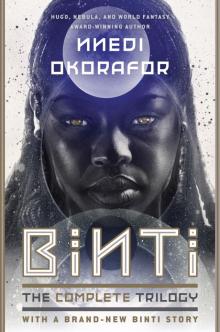 Binti, The Complete Trilogy: Binti ; Home ; The Night Masquerade
Binti, The Complete Trilogy: Binti ; Home ; The Night Masquerade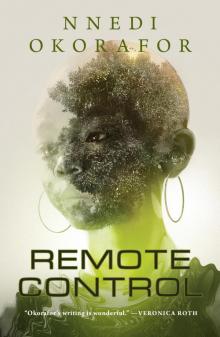 Remote Control
Remote Control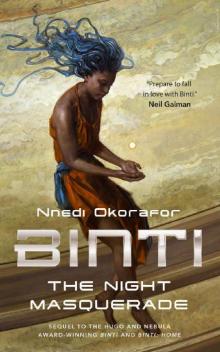 Binti: The Night Masquerade
Binti: The Night Masquerade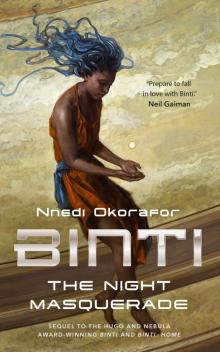 Binti--The Night Masquerade
Binti--The Night Masquerade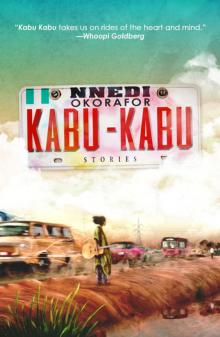 Kabu Kabu
Kabu Kabu Binti
Binti Zahrah the Windseeker
Zahrah the Windseeker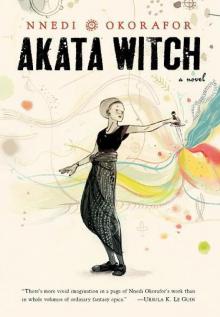 Akata Witch: A Novel
Akata Witch: A Novel Ikenga
Ikenga Who Fears Death
Who Fears Death Binti--Home
Binti--Home Lagoon
Lagoon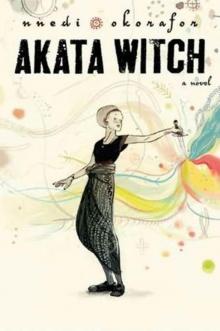 Akata Witch
Akata Witch The Book of Phoenix
The Book of Phoenix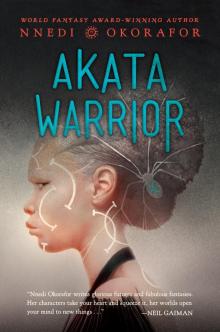 Akata Warrior
Akata Warrior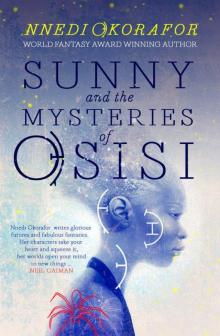 Sunny and the Mysteries of Osisi
Sunny and the Mysteries of Osisi